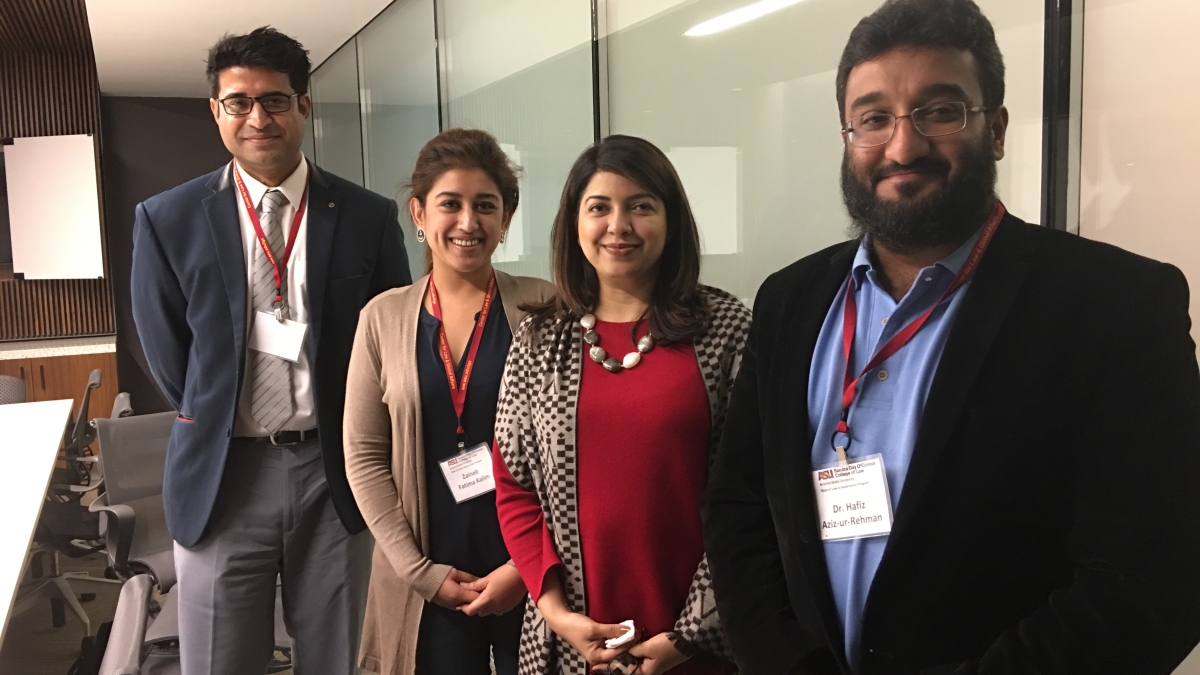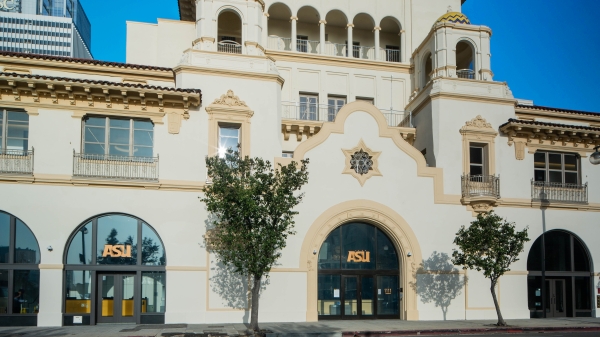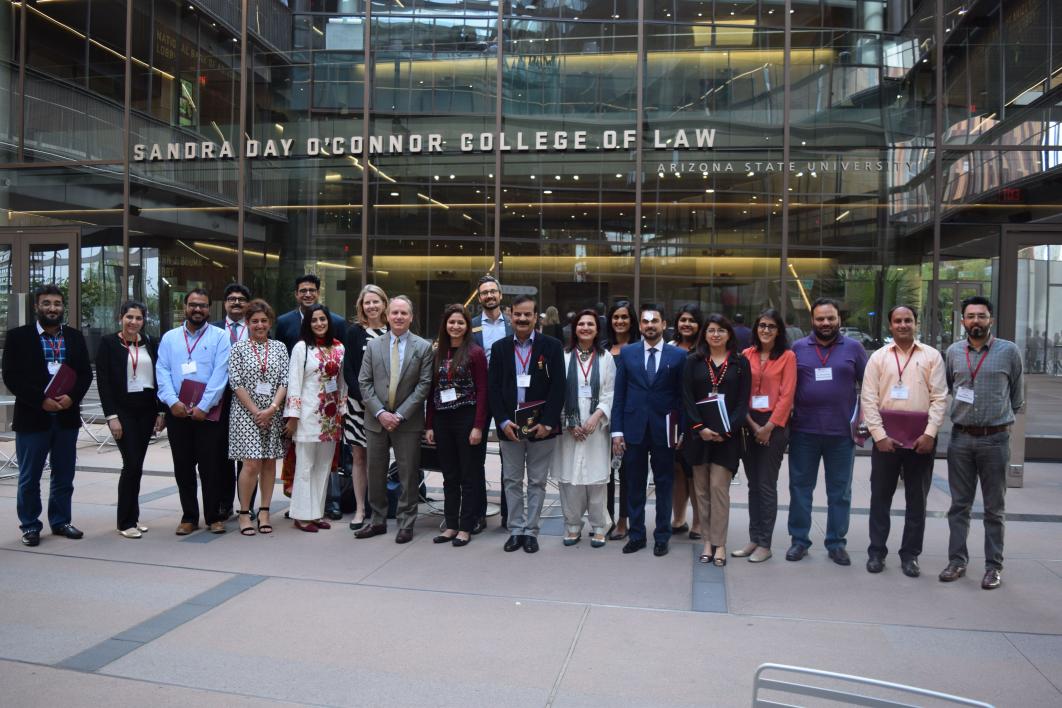Bridging the legal divide in Pakistan
ASU Law to help Pakistan strengthen legal education system

The rule of law is the foundation of any stable political system and thriving economy. Strengthening the rule of law wherever it is vulnerable is essential to resolving today’s greatest security, environmental and economic challenges.
The global Rule of Law and Governance Program, jointly developed by the Sandra Day O’Connor College of Law and the McCain Institute for International Leadership at Arizona State University, focuses on firming up independent and fair legal systems in countries where citizens are not routinely able to protect their fundamental rights in courts, where economic development suffers from a lack of trust in the justice system and where accountability for all citizens is not ensured.
The State Department awarded a $1 million grant to ASU to leverage its Rule of Law and Governance Program to improve Pakistan’s legal education system with an innovative program that will increase law students’ practical skills and improve faculty members’ capacity to teach those skills.
“The grant enables a few law schools in Pakistan to establish and strengthen legal writing and experiential education programs with the assistance of ASU Law’s outstanding faculty. We hope this program will mark the beginning of a long relationship with these schools and help them make a strong case for broader reforms in Pakistan’s legal education system,” said Julia Fromholz, professor of practice at ASU Law and director of the Global Rule of Law and Governance Program.
Pakistan’s high incidences of corruption and terrorism, in addition to less serious crimes, limit the potential of many of its citizens and threatens the national security of countries around the world.
Efforts to reduce corruption and terrorism are impeded by the weakness of Pakistan’s criminal justice system, which is exemplified in the offices of public prosecutors. Police used to present court cases and, therefore, prosecutors are relatively new to Pakistan and may lack the basic skills needed when they start working.
As part of this 12-month program, ASU Law is partnering with three Pakistani schools (Pakistan College of Law and Quaid-e-Azam Law College in Lahore and the School of International Law in Islamabad) to improve the practical legal skills of Pakistani law students; increase the quality and quantity of legal research and writing; improve curricula, research and teaching methodology; and increase interest among Pakistani law students in the prosecution service and the perceived prestige of prosecution.
Pakistan law professors visit ASU Law.
“Students in the United States train for practice,” said Syed Muhammad Mustafa Aleem, faculty member at Quaid-e-Azam Law College. “This is very rare in our country where we do training after our third year. In the US, we start from day one. We teach theory, but that’s not what we should focus on. At the end of the day, it’s practical skills that matter.”
As part of the program, 16 law professors and faculty from six law institutions in Pakistan visited Phoenix to learn from ASU Law professors. They observed classroom interactions between faculty and students, presentations from faculty about clinics and legal writing courses and received curriculum guidance.
“The traditional education we have back home is very different from what is offered here,” said Hafiz Aziz-ur-Rehman, assistant professor and legal advisor to the president of International Islamic University of Islamabad. “We had an idea that ASU Law had a more practical focus, but we realized the courses were much more practical than what we expected. The applied courses and the experiential, simulation-based courses are really fascinating.”
According to the program goals, improving the teaching of fundamental skills such as research, analysis, writing and advocacy to Pakistani law students will enable them, upon becoming lawyers, to argue individual cases more effectively as well as understand, reform, and implement laws, all of which are required for strengthening legal institutions.
Aleem was impressed with how ASU Law faculty interacted with the students. “They engage students all the time. They make it more interesting. Teachers are well prepared for their lectures. If one thing doesn’t click, they have something else in mind to pivot to.”
Many of the professors agreed that Pakistan’s legal education system is partly responsible for the weak judicial sector institutions. Memorization instead of rigorous analysis is the norm, and most students graduate without having learned practical skills. Helping Pakistan build effective criminal justice institutions requires investment in law students.
In addition to the legal education system, according to Tasneem Kausar, principal and professor of law at Pakistan College of Law, the law profession is also in need of a perception makeover.
“It’s not like in the US where you come out of law school and get a good job. Not many students are opting to go into the law profession, or it’s not their first choice because the immediate incentive is not there,” Kausar said. “We need to address this by turning out great law students with proper training.”
Overall, the Pakistani professors were impressed with their visit to ASU Law and took away more than they had expected.
“It was extremely inspirational and exhilarating in the sense that we have learned so many things that I frankly could not have foreseen back home,” said Zaineb Fatima, a professor at the School of International Law at Islamabad. “It’s been life changing for me.”
When asked what success would look like after this program, it was clear it wasn’t something that could be determined in the short term.
“We need to make institutions realize that we need to make changes,” Aziz-ur-Rheman said. “We need to convince academics to fix the curriculum. But it’s not done just because this program is done. We need to continue to be the custodians of the change.”
Kausar had similar sentiments. “We need the commitment. The challenge is taking this back to people who were not exposed to this. But I am quite hopeful.”
More Law, journalism and politics

School of Politics and Global Studies director's new book explores mass violence
Why do people commit atrocities and why are certain groups, including religious and ethnic, more vulnerable to large-scale…

ASU faculty contributing to improvement of Wikipedia
Many academics have a love-hate relationship with Wikipedia. While the website has information about almost anything you can…

ASU Law students gain vital experience through Los Angeles location
Students at the Sandra Day O’Connor College of Law at Arizona State University may be concentrated in the school’s downtown…
